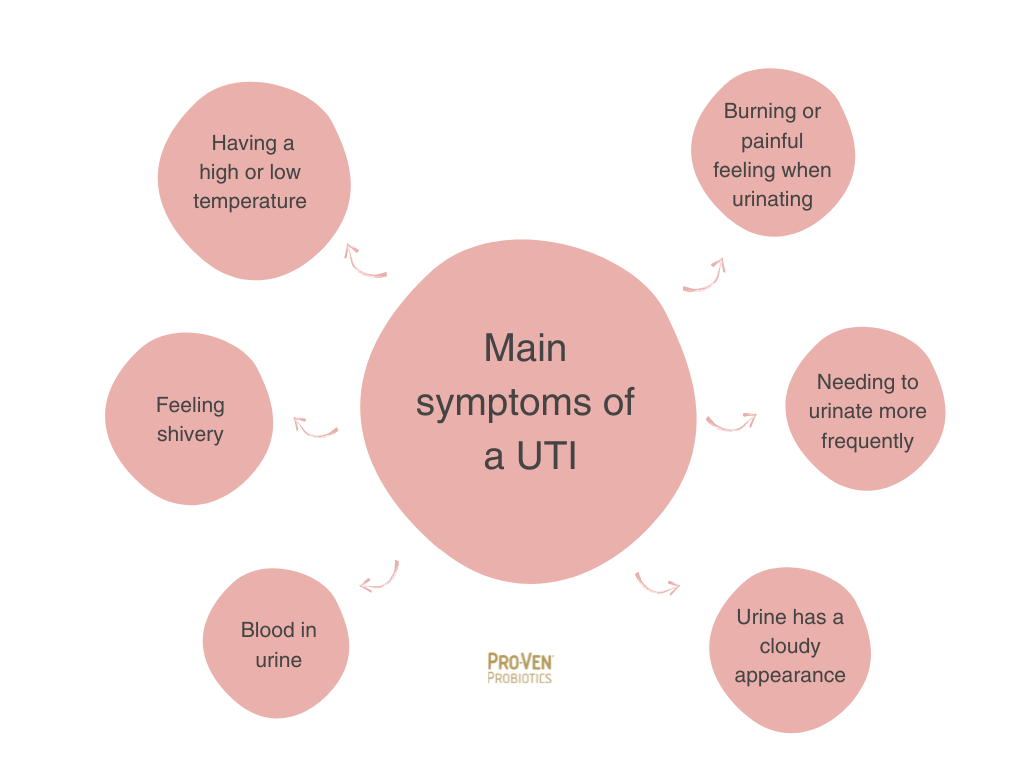- © 2018 - 2022 ProVen Probiotics. Cultech
- Contact Us
- Cookie Policy
- Privacy Policy
- Terms and Conditions
Probiotics and Urinary Tract Infections
Urinary tract infections (UTIs) are bacterial infections of any part of the urinary tract that cause inflammation. More than half of all women in the UK experience a UTI in their lifetime and around half of these have recurrent episodes in the following six months. Urinary tract infections are the most common bacterial infection amongst women.
What are the main symptoms of a UTI?
Frequent symptoms of a UTI include:
- a burning or painful feeling when urinating
- needing to urinate more frequently
- urine having a cloudy appearance
- blood in urine
- feeling shivery
- having a high or low temperature

What causes a UTI?
Anything that leads to a change in the usual urogenital bacterial flora (ie. the normal beneficial bacteria that inhabit the vagina and urethra) can cause a urinary tract infection. In many cases, this is due to a transfer of bacteria from the rectum to the urethra after a bowel movement.
However, in post-menopausal women, a change in their vaginal microbiome can also increase the risk of UTIs. This is due to a natural decrease in levels of Lactobacillus spp. which is the primary bacteria in the vagina of pre-menopausal women.
As numbers of Lactobacillus spp. decline, they allow the overgrowth of pathogenic Escherichia coli (E. coli), which is the main uropathogen and responsible for the majority of UTIs. As space is made available, they can attach to the lining of the bladder, kidney or urethra and then multiply and cause infection. It is worth noting that in small numbers, E. coli lives alongside beneficial bacteria in the GI tract.
In addition, the reduced levels of Lactobacillus (which are naturally acid forming) alter the pH, making it more favourable for E. coli colonisation.
Reduced numbers of Lactobacillus spp. may also be seen in younger women who have taken several courses of antibiotics, or used regular spermicidal contraception.
How can I treat a UTI at home?
There is increasing clinical evidence to support the use of probiotics in UTI management. The mechanisms by which they have an effect have been shown to include balancing the immune system, reducing the bacteria moving up from the intestines and preventing bacteria from colonising and surviving in the urinary tract.
Cranberry has also been extensively studied for its potential in managing UTIs. Researchers believe that the polyphenols cranberries contain – anthocyanidins and proanthocyanidins – could be the reason cranberries have proven effective in preventing UTIs. These plant compounds are anti-microbial and have also been shown to prevent the adhesion of E. coli to the urinary tract lining.
Other nutrients that have been shown to help with managing UTIs include a natural sugar called D-Mannose and vitamin C.
Following a healthy balanced diet, drinking plenty of water and reducing intake of sugary food and drinks can also help to support immunity generally and to maintain the balance of healthy bacteria throughout the body. Increasing water content is especially critical if you are urinating more frequently, as it’s important to replace any lost fluids.
Please note that it is important to speak to your GP if your UTI does not clear up after a couple of days of trying home remedies, or if you find you suffer from recurrent infections.

If you’d like to read more about UTIs:
Urinary tract infections (UTIs) – NHS
What is a Urinary Tract Infection (UTI) in Adults? – Urology Care Foundation
Want to know more?
ProVen Probiotics aim to provide the best support for both you and your health. If you wish to know more about gut health and UTI bacterial infection, please do not hesitate to call us on 01639 825107 or alternatively, learn more via our blogs or in-depth ProVen research.
ProVen Probiotics, Unit 2 Christchurch Road, Baglan Industrial Park, Port Talbot, SA12 7DJ. Tel: 01639 825107

 Available from the 8th March to the 19th March on our three most popular women’s probiotics.
Available from the 8th March to the 19th March on our three most popular women’s probiotics.  Discount added automatically at checkout for you.
Discount added automatically at checkout for you. 
